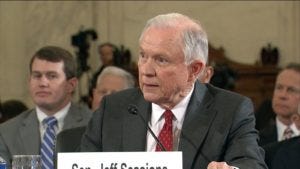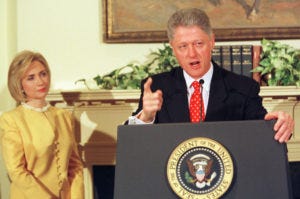Why Jeff Sessions Is Unlikely To Face Perjury Charges
His testimony may have been unclear, but likely was not criminal
Did Jeff Sessions commit perjury? Washington is abuzz over whether the new Attorney General may have lied during his confirmation hearing before the U.S. Senate. During his sworn testimony and in a written questionnaire, Sessions denied having any communications with Russian officials during the course of President Trump’s campaign.
Then last week the Washington Post reported Sessions had met with the Russian ambassador to the United States in July and September of 2016. At the time, then-Senator Sessions was a member of the Senate Armed Services Committee but was also serving as a top foreign policy advisor to the Trump campaign.
In public statements and at a press conference last Thursday, Sessions claimed his responses were truthful. He said he understood the questions to relate only to contacts with Russians on behalf of the campaign. His meetings with the Russian ambassador, he maintained, were in his role as a Senator, not as a Trump campaign surrogate. As such, he did not consider those meetings relevant. Although he said in hindsight he wished he had mentioned the meetings, he said he had no intent to lie.
Attorney General Sessions has now recused himself from any investigation involving President Trump’s campaign. But this has not put to rest the controversy surrounding his Senate testimony. Some Democrats have called on him to resign, and there have been widespread allegations that the new Attorney General may be guilty of perjury.
The political implications of all of this are still playing out. But criminal implications are a different matter. New information may come to light, but based on the facts we have now it’s extremely unlikely a perjury case against Sessions would be appropriate or successful.
The Questions and Answers
The precise questions and answers are extremely important in any perjury case. Here is the question posed by Senator Al Franken during the Senate Judiciary Committee hearing on January 10, and Senator Sessions’s response (video here):
Franken: CNN just published a story alleging that the intelligence community provided documents to the president-elect last week that included information that quote, “Russian operatives claimed to have compromising personal and financial information about Mr. Trump.” These documents also allegedly say quote, “There was a continuing exchange of information during the campaign between Trump's surrogates and intermediaries for the Russian government.”
Now, again, I'm telling you this as it's coming out, so you know. But if it's true, it's obviously extremely serious and if there is any evidence that anyone affiliated with the Trump campaign communicated with the Russian government in the course of this campaign, what will you do?
Sessions: Senator Franken, I'm not aware of any of those activities. I have been called a surrogate at a time or two in that campaign and I didn't have — did not have communications with the Russians, and I'm unable to comment on it.
As many have observed, Sessions did not answer the question asked. Rather than saying what he would do as Attorney General, he volunteered information about his own contacts with the Russians. After this non-response, Franken did not follow up about Russian contacts but simply said, “Very well,” and moved on.
In a written questionnaire submitted after the hearing, Sessions again denied any contact with Russian officials regarding the 2016 election. In that questionnaire Sen. Patrick Leahy asked: "Several of the President-elect’s nominees or senior advisers have Russian ties. Have you been in contact with anyone connected to any part of the Russian government about the 2016 election, either before or after election day?" Sessions responded: "No."
The Law of Perjury
The relevant perjury statute, 18 U.S.C. § 1621, applies to any witness under oath who “willfully and contrary to such oath states or subscribes any material matter which he does not believe to be true.” Sessions was under oath. He now admits he met with the Russian ambassador. There is little doubt this information would have been material to the Senate’s inquiry. So as with so many white collar cases, the issue boils down to the potential defendant’s state of mind.
Not all false statements under oath are perjury. A perjury charge requires the government to prove the defendant was deliberately lying. If the witness misunderstood or misinterpreted the question, that is not perjury. Nor is it perjury if the witness didn’t remember relevant information. Even if a witness is deliberately evasive, it's not perjury if the testimony is literally true. To convict, the government must prove beyond a reasonable doubt not only that the statement was false but also that the witness believed it was false when he made it.
Bronston v. United States
Any discussion of perjury should begin with the leading Supreme Court case, Bronston v. United States (1973). Mr. Bronston testified in a bankruptcy proceeding involving his motion picture company. During that testimony the following exchange took place:
Q: Do you have any bank accounts in Swiss banks, Mr. Bronston?
A: No, sir.
Q: Have you ever?
A: The company had an account there for about six months, in Zurich.
At the time of this testimony Bronston had no Swiss bank accounts and his company had previously had an account in Zurich. His answers were therefore literally true. It was also true, however, that Bronston had previously held a personal Swiss bank account. That account was closed at the time of his testimony. His non-responsive answer to the second question effectively concealed that information.
The government later prosecuted Bronston for perjury. It alleged that his answers, although literally true, were misleading and left a false impression and therefore constituted perjury "by negative implication."
The Supreme Court rejected this theory and held perjury requires testimony that is actually false. The Court noted that true statements do not violate the language of the statute, even if they are non-responsive or potentially misleading. The statute requires that the witness make a statement he does not believe to be true.
Even if a witness is deliberately evasive, the Court noted, that is to be expected in an adversary proceeding. The burden is on the questioner to pin the witness down. Perjury will not be charged “simply because a wily witness succeeds in derailing the questioner – so long as the witness speaks the literal truth.”
What Is the Meaning of “Is?”
A more well-known example of allegations of perjury involved former President Bill Clinton. When testifying in the grand jury he was asked about a statement made by his lawyer in a civil deposition. His lawyer had stated that Monica Lewinsky filed an affidavit saying there “is no sex of any kind in any manner, shape or form, with President Clinton.” When asked whether that statement by his lawyer was false, Clinton famously replied, “It depends on what the meaning of ‘is’ is.”
As Clinton explained, his lawyer’s statement was present tense – there “is” no sexual relationship. At the time of the statement the relationship between the President and Ms. Lewinsky had ended some time ago. As a result, Clinton testified, the statement that there “is” no sexual relationship was literally true.
The House of Representatives characterized this testimony as perjury in its Articles of Impeachment. But no criminal prosecutor worth his salt would have brought a perjury case. In a trial for perjury the President would have had a rock solid defense: his answer was true. The political consequences of an answer seen as slick and evasive were devastating, but the testimony was not criminal.
Why Proof of Perjury Is So Demanding
As these cases demonstrate, proving perjury is difficult. This is by design. As the Court noted in Bronston, if perjury is not narrowly construed even honest witnesses might fear to testify. Being examined under oath is stressful and unfamiliar territory for most people. Questions may be misunderstood or misinterpreted. Witnesses might forget relevant information. People should not fear being charged with perjury for inaccurate testimony that may have resulted simply from confusion, stress, or misunderstanding.
This is particularly true considering how easy it usually is for a skilled questioner to avoid any such confusion. The questioner must be alert to any evasion or uncertainty and ask appropriate follow-up questions. For example, the lawyer in Bronston failed to ask the obvious next question: “I didn’t ask about the company Mr. Bronston. Did you personally ever have any Swiss bank accounts?” And the questioner in President Clinton’s deposition also failed to follow up: “OK, so you say there is no sexual relationship of any kind. Was there ever?”
It’s not enough if testimony ends up being misleading or unclear. Perjury prosecutions are only successful when a good questioner has removed any reasonable possibility of uncertainty or confusion. Short of that, there is usually too much wiggle room. If the witness later claims the answer was literally true or the question was misinterpreted, proving a deliberate lie beyond a reasonable doubt will be extremely difficult.
Did Jeff Sessions Commit Perjury?
With these principles in mind, let’s consider whether there might be a valid perjury case against Sessions. His critics have focused on his statement to Senator Franken that he “did not have communications with the Russians.” Taken in isolation, that is untrue. But Franken’s question was based on a news report that Trump campaign representatives had been in contact with Russian officials. Sessions’s statement was preceded by his observation that he was occasionally considered a campaign surrogate.
Given the context of Franken’s question and Sessions’s full response, it’s not unreasonable for Sessions to maintain he was referring to any Russian contacts he may have had in his role as a campaign surrogate. Both the question and answer were couched in terms of contacts by the campaign. If it’s true his meetings had nothing to do with the campaign, Sessions could have thought they were not relevant.
Senator Franken has said he believes Sessions should have mentioned the meetings anyway. Sessions himself said in his news conference he now thinks it would have been better if he had done so. But testimony that ends up being misleading or incomplete is not perjury if it is based on an unclear or misinterpreted question the witness thought he was answering.
When it comes to the written questionnaire the potential case against Sessions is even weaker. It specifically asked whether he had communicated with any Russian officials “about the 2016 election.” If in fact his meetings did not involve the election, then his “no” response was completely truthful.
Senator Sessions may have been honestly trying to respond to the questions. He may have been confused or may have interpreted the question differently, as he says. He may have been trying to be cagey to conceal relevant information. Or he may have been deliberately lying. Just as in the case of Mr. Bronston, we’re not sure. And in criminal law, that kind of uncertainty usually translates to reasonable doubt.
The Unasked Follow-Up Questions
Some have argued that Sessions used his non-responsive answer to pre-empt further questioning by his blanket denial of any contact with the Russians. That doesn’t make a lot of sense to me. Even if you are willing to commit perjury if forced, why go out of your way to lie about something that wasn’t asked? Why try to head off a line of questions that Sen. Franken did not even appear to be pursuing?
Sessions could have easily given some non-committal answer about what he would do as Attorney General without exposing himself to possible perjury charges. In any event, a non-responsive answer does not "pre-empt" further questioning -- it invites it. As the Court said in Bronston, the burden is on the questioner to pin a wily witness down. Imagine if Sen. Franken had followed up with this series of questions:
“Well, OK, I didn’t ask you about your own contacts with the Russians, but since you brought it up -- are you testifying that you never had any contact with any Russian officials in your role as an advisor to the Trump campaign?”
“Did you have any contact with any Russian officials at all during the time you served as an advisor to the Trump campaign, whether or not those contacts were on behalf of the campaign?”
“Are you aware of anyone else involved in the Trump campaign who had any contact with representatives of the Russian government?”
“Did anyone in the Trump campaign ever ask you to contact any officials in the Russian government on behalf of the campaign?”
If we had answers to these questions, there would be no ambiguity. If Sessions had denied any contact with Russian officials in any capacity at all, the perjury argument would be much stronger. On the other hand, if he had responded truthfully about his meetings with the Russian ambassador, all the controversy of the past week would have been avoided.
Political Remedies v. Criminal Remedies
Critics of Sessions may say I am being too lenient. They may say I am bending over backwards to give him the benefit of the doubt. Yes, I am. That’s how the criminal justice system works. Sessions is innocent until proven guilty – not the other way around. And proving guilt beyond a reasonable doubt to a unanimous jury is a lot tougher than indicting someone on Twitter.
Many are convinced that Sessions deliberately lied. They may be correct. But a criminal case has to be based on evidence, not on gut feelings and suspicious circumstances. Currently the government could muster little in the way of admissible evidence to contradict what Sessions has said about his intent.
Of course this assumes no additional evidence comes to light. If emails, other documents, or witness testimony were to surface indicating that Sessions’s meetings with the ambassador were in fact on behalf of the campaign, that would completely change the picture. As with President Clinton and his “meaning of is” answer, the political consequences of all of this for Sessions and Trump may be severe.
But political remedies are one thing, and criminal remedies are quite another. At least at this stage, those calling for perjury charges are off the mark.






